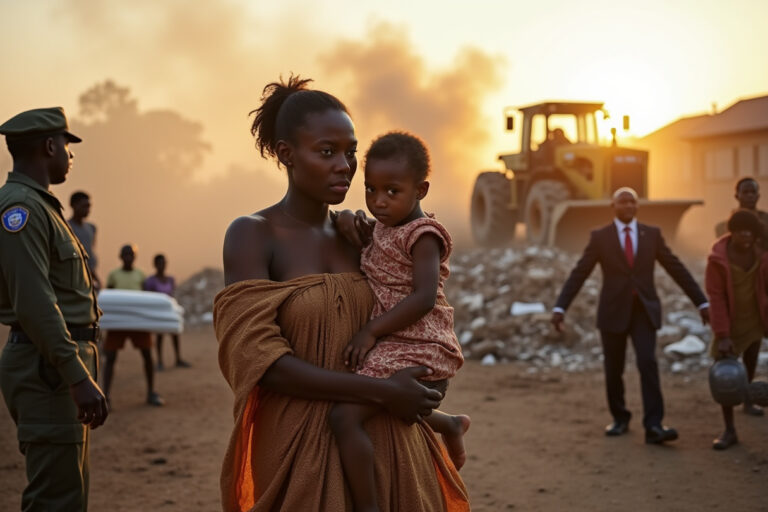A Story of Demolition, Displacement, and the Case for Compassionate Urban Policy
They came at dawn.
Not with letters or meetings or warnings, but with steel teeth and flashing lights.
The first thing Mama Sade heard was the choking cough of diesel engines and the grinding of metal. The second was her neighbour, Baba Kareem, shouting from across the compound, “Olorun o! They’ve come again!”
By the time she rushed outside, barefoot, wrapper trailing in the dust, gripping her four-year-old daughter, Aduke, by the wrist, two homes had already collapsed. Tin roofs spun through the air. Walls folded like akara wraps. Smoke and dust rose up like a curse.
“No notice?” someone shouted.
“They said it’s illegal land,” another muttered, dragging a mattress across the sand.
Mama Sade looked at what used to be her cooking shed and whispered, “Since when did poverty become a crime?”
In Ilado settlement, on the edge of Abuja’s sprawl, that Thursday morning felt like judgement day. Over 10,000 people were displaced. Children cried. Chickens flapped madly. Families watched the homes they built with sweat and savings turned to rubble, not by storm or fire, but by government machines.
Some residents clutched their PVCs like they might work as charms. Others gathered buckets, yams, transistor radios, and placed them gently by the roadside as if waiting for a miracle to carry them elsewhere.
“They said criminals were hiding here,” one of the officers offered, eyes averted, his helmet tilted too low.
“Oh,” Baba Kareem replied, breathing heavily, “and you think criminals will sit still for bulldozers? Are we the ones you came for?”
The irony stung. A move that was supposed to chase crime had only succeeded in creating chaos.
This is not new. From Cape Town to Mumbai, cities have learned that demolitions without a plan breed disaster.
Children stop schooling. Immunisation cards disappear. Pregnant women deliver on benches. Young men, stripped of dignity and home, drift into danger.
A demolition without compensation is not just a broken wall. It is a broken promise.
But it does not have to be like this.
In Kigali, when informal settlements are cleared, families are given temporary homes with running water and toilets. In Medellín, slums were integrated into the city, not erased. In Lagos, recent pilot projects have tried involving communities in the planning. There are choices now, not threats.
What if, instead of flattening lives, we documented them?
What if Ilado’s residents had NINs that opened doors to public services? What if children like Aduke stayed in school through the storm?
What if demolition wasn’t the end of a story, but the beginning of a better one?
What if Mama Sade and Baba Kareem were invited to planning meetings instead of waking to roaring engines?
“We want development,” Mama Sade would say, if they asked. “But not like this. Not like we are ants being swept aside.”
Imagine a government that listens before it acts. Imagine a minister who visits before he condemns. Imagine urban planning with heart, not just maps.
We need security, yes. But not the kind that scares communities. The kind that keeps people safe, seen, and respected.
If Abuja is to grow with grace, it must choose its direction carefully. Empty estates and wide roads mean nothing if they sit beside broken lives.
Policy must be driven by data, not ego. Agencies must work together, not against each other. And above all, the people must matter.
Let there be demolition, yes, but only when there is housing. Only when names have been registered. Only when families have somewhere to go.
Anything less is not urban renewal. It is organised forgetting.
So, the next time you hear the rumble of bulldozers at dawn, ask not just what they are breaking down. Ask who they are pushing aside.
Because a city is not its concrete. It is its people.
And any city that forgets its people will one day find itself forgotten too.





